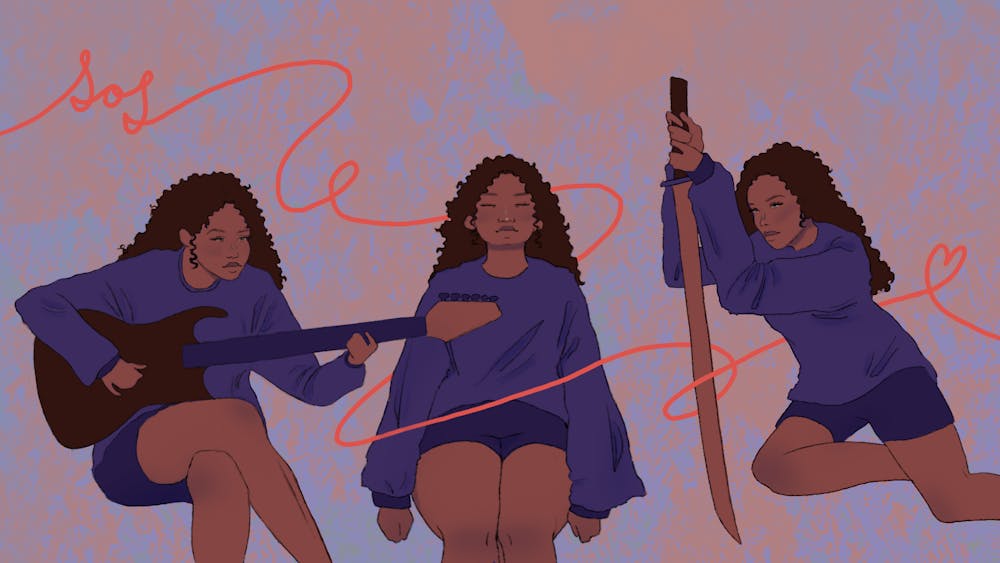Listeners stay connected to music because of their emotions. Love and music, particularly, seem to have an unbreakable connection. As we experience it in its various forms, love can be unpredictable, beautiful, ugly, etc. Regardless, the overarching theme is this: love is too complex to fit under one genre, and this is a message SZA brings to fruition through her newest studio album: SOS.
Through a journey with numerous different genres, she has proved that even after a five-year hiatus, her connection with her listeners and their emotions is stronger than ever. Even for those that have never listened, there’s a connection to be found in this album.
Vulnerable, emotive music is nothing new to the worldwide phenomenon. Though, when SZA debuted her first studio album, CTRL, she stayed under the R&B umbrella. She harnessed her art to communicate themes of love, insecurity, and loss, effectively breaking through listeners’ emotional barriers with “diary—like ruminations.” To say the least, she did it quite successfully; it became the second–longest female R&B album on Billboard 200. Now, she has taken her artistry to the next level, breaking genre barriers alongside records with her newest hit album.
SZA has effectively created an album unpredictable in sound, but enrapturing nevertheless. CTRL had a more fixed, R&B–esque structure, while SOS has left critics confused at the thought of confining it into one genre. Arguably, this was SZA’s intent.
In an interview on the meaning of CTRL with Genius, she claimed, “I have no control … I’m craving control … it’s a culmination of all these things, of this word, of this concept that’s just run my life for so long.” Yet, SOS makes quick strides across conflicting themes ranging between confidence and insecurity, self–love and self–hate, and more. It morphs through genres spanning from CTRL’s R&B to Rap and even sprinkles in some pop–punk that’s reminiscent of Disney Original movies (F2F and Lemonade Mouth parallels, anyone? No? Just me?). SOS is a melting pot that perfectly encompasses the versatility of love’s spectrum. Through it, SZA does more than speak to our emotions—she communicates the idea that love is intangible, unable to be expressed through one sound, lyric, or tone.
In producing CTRL, SZA assumed a position as the alternative R&B artist that listeners needed and wanted at the time. This time around, with SOS, she re–establishes herself as a newly–formed, genre–bending savant. With lines ranging from “Get a rise out of watching you fall,” to the infamous “I might kill my ex,” SZA captures the intense anger that can arise from heartbreak, whether it’s delivered through a pop–rock song or something with a sweeter melody. In the same album, however, we see themes of disappointment, dependency, and confidence.
Despite their differences, both CTRL and SOS give fans an intangible and everlasting sentiment: comfort. Through sweeping melodies and masterful lyricism, SZA offers listeners a relatable voice, speaking to all of love’s complexity. She lets you know that it’s okay to feel the full spectrum of emotions, including the good, the bad, and everything in between.
From the moment SOS dropped, there have been speculations that it may be SZA’s last album. Despite these rumors, SZA has yet to confirm this statement herself. However, these rumors could explain the variety seen in SOS in contrast to CTRL's fairly linear structure. At the same time, it’s been five years since the release of CTRL. As an artist, SZA has grown.
Throughout her discography, SZA’s ability to imbue emotional connectivity and vulnerability are ever–present. Her heart and voice follow the same emotional wavelengths as many of her fans. Ultimately, it is the sense of familiarity that SZA brings to her artistry that keeps her fans connected. What is unique is that this familiar connection is maintained, and even strengthened, through her use of different genres in SOS. In this relationship, it is evident that the dependability is mutual. In the language of love, she can count on her fans to receive, and they can count on her to deliver: Even when it means waiting five years for new music!

